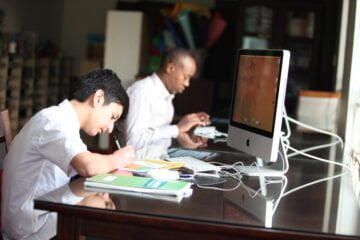Why in schools we’re taught what to learn, but not how to learn? If education and knowledge are so important, both in school and in life, why is it that we’re not taught this basic skill?
The behavior of traditional schools
- Because schools aim to fill the student’s brains with basic info (required to pass tests (that lead to certificates (that lead to jobs))).
- They do not aim to help children to think for themselves. They do not teach the art of learning.
- Do not teach the art of seeking out, experiencing or creating knowledge in any given field. Instead, they provide desiccated, frozen inedible stuff in the form of directives or commandments.
- Hardly encourage students to try out things and figure out ways of doing things or improving things. These are subjective qualitative life skills.
- They leave out the whys and mostly concentrate on the whats and hows of things. These are easier to test and grade.
- Never look at why-not and what-ifs that are at the core of learning.
- They abstract things away from the concrete stuff of daily life.
- They test for individual work and not interpersonal skills of cooperation towards common goals.
Some experts are concerned that schools today aren’t teaching kids the skills they need to succeed. A culture of testing, they say, is preventing the development of “life skills.” Curricular content aside, what do you think you are really learning at school? Are you getting skills that will carry you through life?
The ever-growing emphasis is on academic performance and test scores. This means many children aren’t developing life skills like self-control, motivation, focus, and resilience, which are far better predictors of long-term success than high grades.
One of the single biggest differences between ‘quick learners’ and ‘slow learners’, ‘good students’ and ‘bad students’, some students are ‘smarter’ or ‘more intelligent’ than others, but those some students simply have better and more effective learning and study habits than others.
Learning how to learn must surely be one of life’s most important skills. It is surprising they don’t teach it at school. Learning how to learn is the most important life skill. Learning is making connections between what you know, what you don’t and what you want to know.
If you know the ‘right’ answer, but don’t know why it’s the right answer, then you haven’t really learned anything. Points for learning to learn:
- Copy the best: Read/watch/listen to the best in the world at whatever it is you wish to learn, and then take their best strategies and techniques and make them your own. For example- if you want to become a great actor – watch the best actors.
- Learn the information in a variety of ways: Learning a new subject is always most effective when you learn the information in a variety of ways simultaneously:
- Read books and blogs about it
- Listen to audiobooks and podcasts about it
- Watch documentaries, presentations, and videos about it
- Do lots of exercises, quizzes, and practice tests
- Join a club where you can learn along with a group of people
- Try to teach what you’ve learned to others and have them ask you lots of questions to see what you’ve learned and what you haven’t, what you know and what you don’t
- Do It: When it comes to learning a sport or anything with a high degree of practicality: acting, dancing, driving, martial arts, a musical instrument, public speaking, swimming etc, you have to do it. See it. Hear it. Read it. Watch it. Do it.
- Audiobooks and podcasts are a winning habit, and they’re especially good for people who don’t like reading and/or don’t have time to read.
More to learn
- Arguments and debates: Debates are great because you get to hear all of the best arguments, evidence and reasons “for” and “against” the idea, debated on both sides by experts.
- Question everything: Asking questions is an important part of the learning process. Don’t be shy to ask questions if you don’t know something.
- Why is this important? Why do I need to know this?
- What are the most important ideas and lessons presented in this article/book/lecture/podcast/video?
- How would I describe this in one paragraph or less?
- After reading/watching/listening ask yourself what you don’t know, what you don’t understand, what isn’t clear, what points need to clarify?
- How to use this information and put it into practice?
- Get in the habit of questioning and thinking critically about what you’re reading and being skeptical, instead of automatically accepting and believing it.
- Try to teach what you have learned to others: When you try to teach to others, and they ask you questions for clarification, it’ll quickly highlight the gaps in your knowledge and you’ll soon find out what you know and what you don’t.
Lancers International School aims to provide an environment in which all students will become lifelong learners, who are responsible, disciplined, and ethical citizens of the world. Being one of the best schools in Gurgaon, Lancers International school welcomes students who being love being challenged- intellectually, socially, and personally.
The objective of the school is to:
- develop sensible, well rounded and complete human beings through academic, aesthetic and athletic activities.
- encourage a social environment in the school that creates international understanding amongst those represented within the school community.
- build self-esteem and leadership qualities.
- uphold an uncompressing commitment toward excellence.
- provide a safe and nurturing community where diversity is celebrated and mutual respect among children and adult is practiced.
- create an environment where students are exposed to challenging, educational opportunities.
- create a platform where teachers, parents, and children evolve together to create a new social awakening.




0 Comments